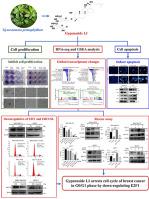Journal of Ethnopharmacology ( IF 4.8 ) Pub Date : 2021-03-11 , DOI: 10.1016/j.jep.2021.114017 Ma-Li Zu 1 , Yu Duan 1 , Jin-Bo Xie 1 , Yan-Shuang Qi 1 , Peng Xie 1 , Almaz Borjigidai 1 , Xiang-Lan Piao 1

|
Ethnopharmacological relevance
Gynostemma pentaphyllum (Thunb.) Makino, a traditional medicine in China, has been widely used for the treatment of various diseases. Gypenoside LI (Gyp LI) is a major constituent from steamed G. pentaphyllum. Previous studies have shown that gypnenoside LI possess inhibitory effect on the growth of many cancer cells. However, its pharmacological effect in breast cancer and the mechanism have not been reported yet.
Aim of the study
To investigate the anti-breast cancer activity of gypenoside LI and underlying mechanisms of gypenoside LI in MDA-MB-231 and MCF-7 cells.
Material/methods
The cytotoxicity of gypenoside LI was determined by MTT, colony-formation and three-dimensional spheroid assay. The migration, cell apoptosis and the cell cycle were investigated through cell morphology observation, flow cytometry analysis and key proteins detection. The anticancer mechanisms of gypenoside LI were detected by RNA sequencing (RNA-seq) and Gene Set Enrichment Analysis (GSEA) transcriptome analysis.
Results
Gypenoside LI inhibited cell proliferation, migration, induced cell apoptosis and cell cycle arrest. Gypenoside LI arrested cell cycle at G0/G1 phase by regulating E2F1. It also inhibited tumor proliferation by regulating the expression of ERCC6L. Interestingly, we found that E2F1 siRNA also down-regulated the expression of ERCC6L. Gypenoside LI showed potential anti-breast cancer cells activity, especially on triple-negative breast cancer cells.
Conclusions
These data indicate that gypenoside LI could inhibit human breast cancer cells through inhibiting proliferation and migration, inducing apoptosis, arresting cell cycle at G0/G1 phase by regulating E2F1. It could be used as potential multi-target chemopreventive agents for cancer.






























 京公网安备 11010802027423号
京公网安备 11010802027423号